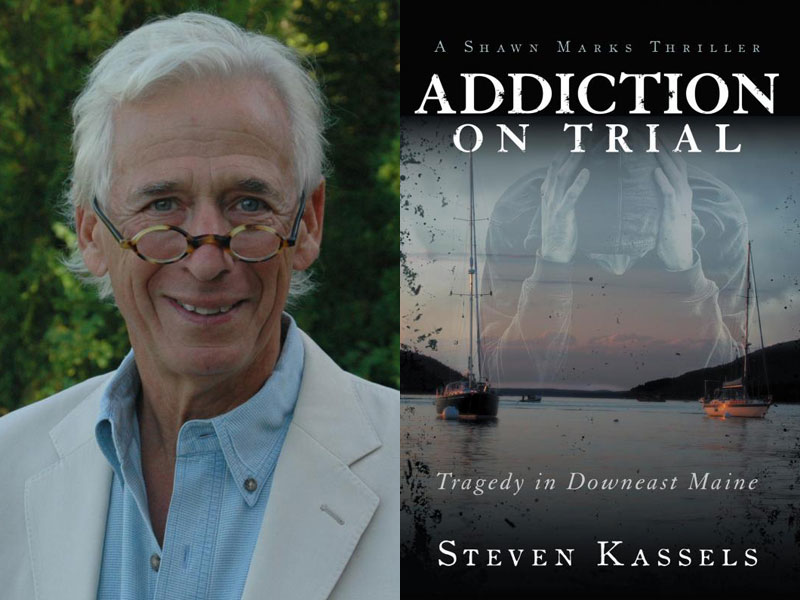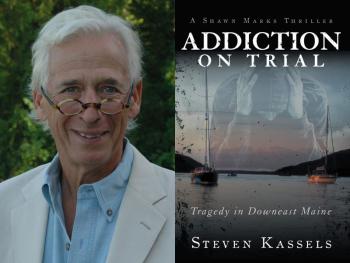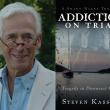Addiction specialist-turned crime novel writer focuses on Down East Maine
LINCOLNVILLE — Author Dr. Steven Kassels, a resident of both Massachusetts and Down East Maine, will be sharing his experience and excerpts from his debut novel at Beyond the Sea in Lincolnville Beach Saturday, June 7 from 1 p.m. to 3 p.m.
Kassels’ had years of practice in both emergency medicine and addiction medicine, which provided the foundation for his first self-published legal thriller/murder mystery, Addiction on Trial: Tragedy in Downeast Maine. The crime novel sends a powerful message of societal discrimination toward drug addicts and explores common misperceptions about what drug addiction really is — a chronic illness requiring a similar treatment approach as other chronic illnesses. He believes that everyone deserves compassion and access to medical care regardless of the nature of the illness. He wrote Addiction on Trial to both entertain and educate, and to depict the struggles of addiction for an audience of avid readers who may expand their understanding of addiction on the basis of evidence.
“It broadened my knowledge a great degree, especially in that addicts don’t have to be in the back alleys. They can function in society like everyone else and hold a job, as long as they can have access to medicine they need to wean off drugs. This was definitely a quality murder mystery; you didn’t feel like you were being educated like a textbook,” said Nanette H. Gionfriddo, owner of Beyond The Sea.
A summary of the novel follows.
When Down East "local" Annette Fiorno is found at the bottom of a ravine, "outsider" and relapsed drug addict Jimmy Sedgwick is accused of murder. Unassuming Maine lawyer Rob Hanston and big shot attorney Shawn Marks form an unlikely legal team as they attempt to discredit the overwhelming evidence. Addiction on Trial, the first in a series of Shawn Marks Thrillers, revolves around the murder cases of Marks, an egotistical yet likable high-powered Boston attorney who can juggle an array of female companions without taking his eye off the legal challenges of his work.
Q: What is your connection to Down East Maine and do any physical locations or businesses appear in the story that readers would recognize?
A: As an author and a physician, I have a longstanding affection for Maine, dating back to my youth as a camper for many summers in Maine and for the past 15 years as a resident of Southwest Harbor; I split my time living in Maine and Boston due to my responsibilities as medical director of an out-patient substance abuse treatment center with locations in Boston, Portland and Lewiston. Addiction on Trial: Tragedy in Downeast Maine is a fictional murder mystery/legal thriller based on medical and legal truths, as it exposes to readers the real life of addiction as an equal opportunity disease that knows no socio-economic boundaries. The book could easily have been titled Addiction on Trial: Tragedy in Boston, or Vermont, or virtually anywhere USA. I chose Down East Maine as the primary setting in order to capture the essence of the people who make this part of Maine so special and to draw on the aspect that no matter how beautiful a place is, lurking in the shadows in ALL of our communities, neighborhoods, families and friends are those afflicted with the disease of addiction. The fictional town of West Haven Harbor has significant similarities to Southwest Harbor, on Mount Desert Island, but places and persons are entirely the product of my imagination and/or are fictitiously used. However, the beauty and peace of Mount Desert Island and the devoted spirit, commitment and passion of its year-round residents is an overarching theme. The cover of the book is a photo of Somes Sound on MDI with a main character of the book hovering in the shadows.
Q: It's not easy to jump from a lifelong profession into being an author. What inspired you to write your first novel and what kind of training did you undergo to turn these experiences into a fast-paced legal/medical thriller?
A: I have always desired to write a novel, but could not find the time through the years of raising a family and attending to my medical professional responsibilities in both emergency medicine and addiction medicine. As I have now stepped back from day-to-day patient care, and with a desire to educate and entertain, I decided to write this novel, which I hope will not only keep readers on the edge of their seats while trying to solve the mystery of Annette's untimely death, but also to de-stigmatize and demystify the disease of addiction while putting real faces on this scourge to society. And, even if one does not want to believe it is a disease, the cost to society to incarcerate someone can be 10 times more expensive than treatment. I wrote this book over the past five years and spent approximately 2,500 hours in the process — a labor of love — but who wants to read another scientific book about addiction? Not me! That's why I wrote the book as a murder mystery/legal thriller to entertain while depicting the realistic struggle of addiction.
Q: Down in the Midcoast, the Fox Hill addiction recovery proposal stirred up a lot of controversy on both sides. Was your novel inspired by these events? If so, what are the messages you'd love your readers to come away with after reading your book?
My novel was in part inspired by the many proposals and controversy in many communities over many years, similar to the issues in the Midcoast. As I also bring to light in my novel and through my op-ed in the Bangor Daily News, which you can find on my website, the “Not In My Back Yard” attitude of not having treatment centers is not a viable option as unfortunately there is not a community in America that does not have people addicted to drugs or alcohol. There is no significant difference in the brain between addictions — there are no good addictions and bad addictions; and just as communities have treatment facilities to treat other chronic diseases like diabetes and hypertension, there should be addiction treatment centers in many, if not every community, to treat alcohol and drug addiction. However, I also sympathize with those who believe that if one community has a treatment center and nearby communities do not, that one town may feel inundated. I believe our public officials need to take a lead on this issue, which I try to address in another op-ed, published by the Boston Globe, “Solutions to the Heroin & Opiate Epidemic.” We cannot forget that addiction is an equal opportunity disease that knows no socio-economic boundaries. I also strongly believe that alcohol and drug treatment centers, both inpatient and outpatient facilities, need to be sensitive to community needs when proposing locations to site. This is why I have set up book club and discussion groups through my website and I hope folks will contact me.
To learn more about Kassel’s novel or where you can find him at book signings this summer, visit addictionontrial.com
Kay Stephens can be reached at news@penbaypilot.com
Event Date
Address
United States
























